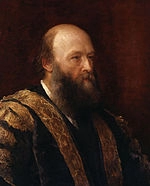How to Pronounce Robert Gascoyne-Cecil, 3rd Marquess of Salisbury
#50
Most Popular
Boost
Feb 03, 1830 Hatfield, England, United Kingdom Died on 22 Aug 1903 (aged 73)
British politician
AquariusRobert Gascoyne Cecil 3rd Marquess Of Salisbury, Date of Birth, Place of Birth, Family, Facts, Age, Net Worth, Biography and More in FamedBorn.com

British politician
Aquarius